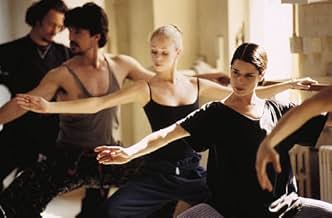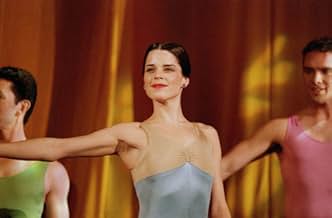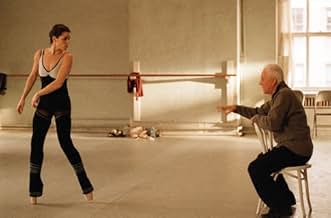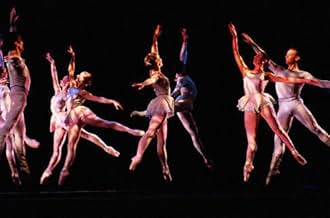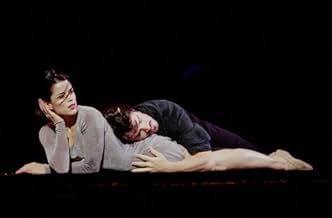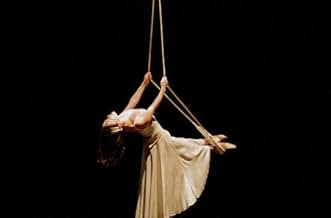IMDb रेटिंग
6.2/10
7 हज़ार
आपकी रेटिंग
अपनी भाषा में प्लॉट जोड़ेंA young ballet dancer is poised to become the principal performer in a group of ballet dancers.A young ballet dancer is poised to become the principal performer in a group of ballet dancers.A young ballet dancer is poised to become the principal performer in a group of ballet dancers.
- पुरस्कार
- 2 कुल नामांकन
Barbara E. Robertson
- Harriet
- (as Barbara Robertson)
Davis C. Robertson
- Alec - Joffrey Dancer
- (as Davis Robertson)
फ़ीचर्ड समीक्षाएं
I love movies about dancers, but usually my favorites are a bit more sugarcoated than The Company. This one was a very refreshing change as it portrays dancers in a ballet company so realistically it feels like a documentary. Most of the actors are real dancers, and they don't act like there's a camera following them around. There are long scenes of rehearsals with bickering, silences followed by interrupted dialogue, mumbling, and dead time while we watch men and women stretching or putting on their shoes. If that sounds boring to you, stick with the Step Up franchise.
I really enjoyed The Company because of the realism. I knew Neve Campbell came from a ballet background, and I was very excited to see her showing off her hidden talents. James Franco does not, unfortunately, strap on a pair of flats and join in on the fun; instead he's Neve's boyfriend in the few scenes that show her enjoying her down time. Malcom MacDowell is the company director, and he's very believable as a passionate, demanding choreographer.
There's a scene that has stayed with me through the years: while rehearsing on stage as the performance grows nearer, a dreadful snap is heard, and one of the dancers collapses and cradles her leg. It's not drawn out dramatically or showcased in a closeup, and because of the lack of special attention, it feels so much more real and accidental. If you like ballet documentaries, or you really appreciate realism to the point of boredom, you might want to check out this movie.
I really enjoyed The Company because of the realism. I knew Neve Campbell came from a ballet background, and I was very excited to see her showing off her hidden talents. James Franco does not, unfortunately, strap on a pair of flats and join in on the fun; instead he's Neve's boyfriend in the few scenes that show her enjoying her down time. Malcom MacDowell is the company director, and he's very believable as a passionate, demanding choreographer.
There's a scene that has stayed with me through the years: while rehearsing on stage as the performance grows nearer, a dreadful snap is heard, and one of the dancers collapses and cradles her leg. It's not drawn out dramatically or showcased in a closeup, and because of the lack of special attention, it feels so much more real and accidental. If you like ballet documentaries, or you really appreciate realism to the point of boredom, you might want to check out this movie.
"The Company" is a lovely commercial for the Joffrey Ballet of Chicago (for New Yorkers this is in fact the same modern ballet company that used to be based at City Center but left the competitive dance fund raising environment here to have the stage to itself in Chicago).
A labor of love for producer/story writer/star/former dancer Neve Campbell, she was determined to make the first film about a whole company, not just using the dance world for a backdrop of individual melodrama, and with long passages of actual performances. So she brought in the primo director of ensembles, Robert Altman. But clearly she made compromises to get the film made that put his creativity as a director in a straight jacket and only lets his trademark talents fleetingly shine through.
The key was getting the Joffrey's cooperation and I can only imagine the tough negotiations that resulted in this pretty much being a whitewash of the ballet world, or of any creative endeavor, in sharp contrast to the behind-the-scenes reality shows "Project Greenlight" on HBO or "The Fire Within" about Cirque du Soleil's "Varekai" that was on Bravo. I surmise a long list of thou shalt not's that appear to include items such as:
-- no views of the non-artistic administrators, board, or fund raisers (there's a passing exhortation to a flashy choreographer Robet Desrosiers to stay within the budget, but he gets the complicated costumes and sets he wants anyway);
-- no homosexual relationships (there's a passing reference to the dancers AIDS has taken including "Bob", which cognoscenti have to know refers to the company's founder Robert Jeffrey, and Malcolm McDowall as the egotistical artistic director "Alberto Antonelli," a stand-in presumably for current company director Gerald Arpino, urges fellow Italian-American men not to make their boys, like he had to, "hide their ballet shoes");
-- no eating disorders (we do twice hear "Mr. A," half-jokingly, urge the company to eat salads and vegetables and there's one fast, quiet exchange in passing that I think was about diet pills);
-- blame dancers' problems on dysfunctional parents and mentors, recalling that vivid song from "A Chorus Line" - "Everything was beautiful at the ballet" as dancers seek to escape messy situations through temporary perfect beauty.
Altman does get to assert his artistic priorities in a few ways. He effectively seizes on the ageism in dance, showing that it's not just the tyranny of aging bodies, as would affect any athlete, but that dancers with experience speak up for themselves and are more difficult to control in a viciously autocratic environment than ambitious, financially desperate, and, literally, pliable young dancers.
It's also the first time I've seen a camera expose the swarm of acolyte assistants to the director, revealing them as ex-dancers whom "Mr. A" still dismissively calls "babies" and who resent the new stars even as they dance vicariously through them.
The other beautiful Altman touch is when the significant character developments take place not center stage in a crowd but through a look or line happening way in the corner of the screen, like the expression on James Franco, as Cambell's chef beau, when she avoids introducing him to her family amidst a rush of congratulators.
But visually and musically the Joffrey is a wonderful choice, as the choreographers represented range from Arpino to Alwin Nikolais to Laura Dean and MOMIX. A centerpiece danced by Campbell is a sexy Lar Lubovitch pas de deux to the signature song "My Funny Valentine" which is used as a leitmotif, for reasons that still seem murky to me after hearing Altman explain why on "Charlie Rose," throughout the film in versions also by Elvis Costello, Chet Baker, and the Kronos Quartet. The music ranges from classical to jazz to the ethereal pop of Julee Cruise, Mark O'Connor's in-between "Appalachia Waltz", and the lovely score by Van Dyke Parks.
A labor of love for producer/story writer/star/former dancer Neve Campbell, she was determined to make the first film about a whole company, not just using the dance world for a backdrop of individual melodrama, and with long passages of actual performances. So she brought in the primo director of ensembles, Robert Altman. But clearly she made compromises to get the film made that put his creativity as a director in a straight jacket and only lets his trademark talents fleetingly shine through.
The key was getting the Joffrey's cooperation and I can only imagine the tough negotiations that resulted in this pretty much being a whitewash of the ballet world, or of any creative endeavor, in sharp contrast to the behind-the-scenes reality shows "Project Greenlight" on HBO or "The Fire Within" about Cirque du Soleil's "Varekai" that was on Bravo. I surmise a long list of thou shalt not's that appear to include items such as:
-- no views of the non-artistic administrators, board, or fund raisers (there's a passing exhortation to a flashy choreographer Robet Desrosiers to stay within the budget, but he gets the complicated costumes and sets he wants anyway);
-- no homosexual relationships (there's a passing reference to the dancers AIDS has taken including "Bob", which cognoscenti have to know refers to the company's founder Robert Jeffrey, and Malcolm McDowall as the egotistical artistic director "Alberto Antonelli," a stand-in presumably for current company director Gerald Arpino, urges fellow Italian-American men not to make their boys, like he had to, "hide their ballet shoes");
-- no eating disorders (we do twice hear "Mr. A," half-jokingly, urge the company to eat salads and vegetables and there's one fast, quiet exchange in passing that I think was about diet pills);
-- blame dancers' problems on dysfunctional parents and mentors, recalling that vivid song from "A Chorus Line" - "Everything was beautiful at the ballet" as dancers seek to escape messy situations through temporary perfect beauty.
Altman does get to assert his artistic priorities in a few ways. He effectively seizes on the ageism in dance, showing that it's not just the tyranny of aging bodies, as would affect any athlete, but that dancers with experience speak up for themselves and are more difficult to control in a viciously autocratic environment than ambitious, financially desperate, and, literally, pliable young dancers.
It's also the first time I've seen a camera expose the swarm of acolyte assistants to the director, revealing them as ex-dancers whom "Mr. A" still dismissively calls "babies" and who resent the new stars even as they dance vicariously through them.
The other beautiful Altman touch is when the significant character developments take place not center stage in a crowd but through a look or line happening way in the corner of the screen, like the expression on James Franco, as Cambell's chef beau, when she avoids introducing him to her family amidst a rush of congratulators.
But visually and musically the Joffrey is a wonderful choice, as the choreographers represented range from Arpino to Alwin Nikolais to Laura Dean and MOMIX. A centerpiece danced by Campbell is a sexy Lar Lubovitch pas de deux to the signature song "My Funny Valentine" which is used as a leitmotif, for reasons that still seem murky to me after hearing Altman explain why on "Charlie Rose," throughout the film in versions also by Elvis Costello, Chet Baker, and the Kronos Quartet. The music ranges from classical to jazz to the ethereal pop of Julee Cruise, Mark O'Connor's in-between "Appalachia Waltz", and the lovely score by Van Dyke Parks.
Some of the dances are tiny religious experiences. The film doesn't look nearly as good as some of Altman's others, but there are flashes of awesome beauty: a topless male dancer alone in a room with golden beams of light, and Neve Campbell in her bath. The movie looks at the queeny pretensions of the boys (and their fathers), the dancers' sex lives (who are more '60s than their instructor knows), and the company leader, played by Malcolm McDowell, whose occasional flakiness is caught by one black dancer. I couldn't help but think of McDowell as an Altman self-criticism: an elderly director working with small budgets, prone to artiness, who champions art as being organic, who rounds up a large crew of performers and calls them "babies." The day-in-the-life shapelessness of the movie didn't at all bother me, though one character, who asks to stay in a dancer's apartment, is dropped pretty quickly. And James Franco is in it. 9/10
If you're a devoted fan of ballet or modern dance, you'll enjoy "The Company." Neve Campbell is Ry, a young ballerina and the focal point of the movie, which is an almost documentary-like portrayal of a professional ballet company preparing for and delivering spectacular dance performances in Chicago. Campbell is a former professional dancer, so she brings authenticity to her performance. However, despite the casting of Malcolm McDowell as an authoritarian, acid-tongued company director to provide a potential source of dramatic conflict with Campbell's character, there's very little story or dialogue in the whole film. Some of the dialogue is so quiet and natural that you can't really make it out. Directed by the great Robert Altman, "The Company" focuses mostly on dance performances and grueling practices, with a few cliches thrown in (the dancers' struggles to win roles, please the choreographer and make ends meet financially). It all looks very realistic and beautiful, and the drama is only in the dance. There's a sweet, slight love story for Ry and her equally hard-working chef beau, played by James Franco. So enjoy "The Company" on a quiet evening, glass of wine in hand, if you love to watch good dance performances, but not if you want dialogue or plot. Still, kudos to Neve Campbell for getting such a tasteful, lovely, non-commercial movie made.
I'm no dance critic, but. . . I was very disappointed with the choice of "The Blue Snake" as the ultimate and climactic "number" in "The Company". To me, it really stood out as the least interesting and most cliched of all the dances in the film. Those outrageous costumes! That "Ice Capades" choreography! Altman & Co. really ought to have chosen a piece that would have shown the Joffrey's more adventuresome side.
I went into this film knowing that it was a "dance movie" with minimal storyline, and I was still disappointed. It's not a good sign when I start looking at my watch halfway through a film. It doesn't bother me that a "dance film" eschews the Melodrama of "The Turning Point" or "A Chorus Line." But "The Company" also eschews Interest! There was basically nothing to "hang onto" outside the dance sequences. Only Ry (Neve Campbell's character) was given any appreciable screentime, and aside from a few quiet moments, she wasn't given very much to do.
Okay, I admit that I liked one dramatic scene a lot: a flirtatious moment between Ry and Josh - the chef who looks like a male model - which takes place in a dive bar. There should have been more scenes like that.
I rate the film a 6 - dramatically disappointing, while the quality of the dance sequences varies from sublime to ridiculous.
I went into this film knowing that it was a "dance movie" with minimal storyline, and I was still disappointed. It's not a good sign when I start looking at my watch halfway through a film. It doesn't bother me that a "dance film" eschews the Melodrama of "The Turning Point" or "A Chorus Line." But "The Company" also eschews Interest! There was basically nothing to "hang onto" outside the dance sequences. Only Ry (Neve Campbell's character) was given any appreciable screentime, and aside from a few quiet moments, she wasn't given very much to do.
Okay, I admit that I liked one dramatic scene a lot: a flirtatious moment between Ry and Josh - the chef who looks like a male model - which takes place in a dive bar. There should have been more scenes like that.
I rate the film a 6 - dramatically disappointing, while the quality of the dance sequences varies from sublime to ridiculous.
क्या आपको पता है
- ट्रिवियाNeve Campbell lost thousands of dollars of her own money to ensure that her fellow cast members received their wages.
- गूफ़At about 1:10 while counting during a rehearsal, Harriet skips the 6th count of 8.
- भाव
Alberto Antonelli: Ry, honey, let's scramble some ideas, instead of some asshole who contradicts me.
- क्रेज़ी क्रेडिटAfter the closing credits begin rolling, the dancers continue to take their final bows, and the audience continues to applaud.
टॉप पसंद
रेटिंग देने के लिए साइन-इन करें और वैयक्तिकृत सुझावों के लिए वॉचलिस्ट करें
- How long is The Company?Alexa द्वारा संचालित
विवरण
बॉक्स ऑफ़िस
- बजट
- $1,50,00,000(अनुमानित)
- US और कनाडा में सकल
- $22,83,914
- US और कनाडा में पहले सप्ताह में कुल कमाई
- $93,776
- 28 दिस॰ 2003
- दुनिया भर में सकल
- $64,15,017
- चलने की अवधि
- 1 घं 52 मि(112 min)
- रंग
- ध्वनि मिश्रण
- पक्ष अनुपात
- 2.35 : 1
इस पेज में योगदान दें
किसी बदलाव का सुझाव दें या अनुपलब्ध कॉन्टेंट जोड़ें







